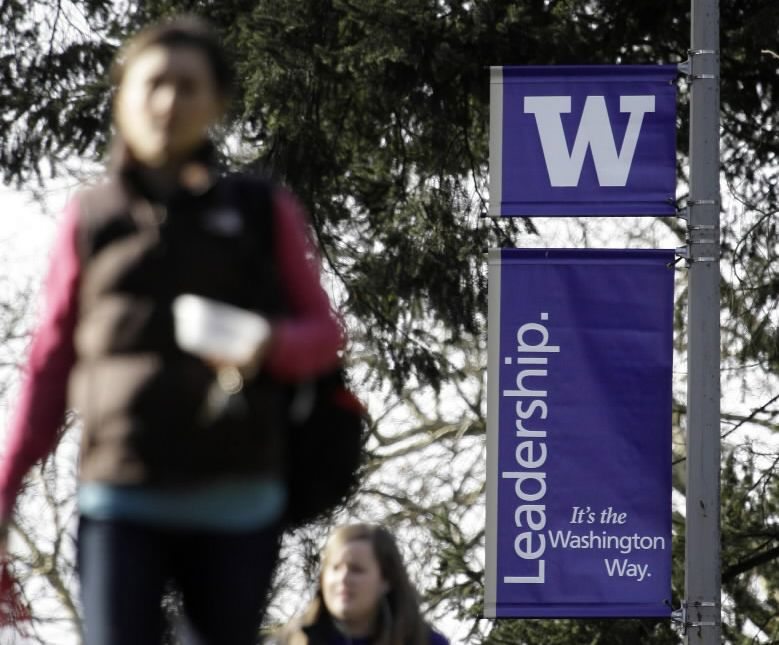Corporate giants Boeing Co. and Microsoft Corp. announced Monday that each will pledge $25 million in the next five years to a new public-private college scholarship program to help students at state colleges and universities pay for steep tuition hikes.
The state will contribute $5 million in seed money in the next two years.
Gov. Chris Gregoire signed the Opportunity Scholarship Act into law Monday at a Seattle high school. At the same event, she signed a measure that gives the state’s six four-year colleges and universities the authority to set tuition through 2019.
The transfer of tuition-setting authority from the Legislature to college and university governing boards is intended to help institutions offset a half-billion dollars in state budget cuts for higher education in the next two years and allow them to preserve programs and faculty.
Tuition has risen by double-digit percentages annually at most state colleges for each of the past two years and is expected to continue climbing in the 2011-12 and 2012-13 school years. Washington State University is expected to hike tuition by 16 percent in the coming academic year.
The Opportunity Scholarship Program, shepherded through the Legislature by Rep. Tim Probst, D-Vancouver, will fill a void in state financial aid programs by making available modest scholarships — worth a minimum of $1,000 each — to students from middle-class families with incomes as high as $98,000 for a family of four. The first scholarships will be awarded in December.
Probst originally introduced the bill in part to encourage students to earn degrees in high-demand fields. But he said Monday it will be up to a public-private governing board to decide whether to make that a criterion for the award of scholarships.
“Washington is the first state in the nation to create a scholarship program like this,” Probst said. “We hope that other companies will follow Microsoft and Boeing’s incredible example.”
The upfront money available this year, $5 million each from the public and private sectors, will fund as many as 10,000 scholarships. That money will be available to students by Christmas, Probst said.
In 10 years, the separate endowment fund is expected to grow to $1 billion, with interest earned funding the scholarship program well into the future.
Under Probst’s bill, the state would be required to match the private money dollar for dollar when its own revenue rebounds to 10 percent more than the state received in 2008. That was the high-water mark for state revenue collections before the recession began to take its toll.
The state’s overall contribution would be capped at $50 million.
Gregoire said the Opportunity Scholarship Act and three other bills she signed Monday are part of an attempt to keep Washington competitive both economically and educationally. The measures came out of a higher education funding task force that was asked to develop proposals to better fund state colleges and universities and improve their accountability and performance.
“Despite these tough economic times, our colleges and universities must have the resources to educate and train the next generation of engineers, scientists and workers,” she said in a statement. “Tuition flexibility will allow them to set their own tuition through 2019” and remain competitive with similar colleges and universities.
To help ensure that taxpayers, students and families get the best return on their investments, Washington will report graduation rates, numbers of degrees awarded and other measurements of student success through the National Governors Association’s Complete to Compete initiative, she said.
Gregoire chairs the association and helped design the initiative.
The state also will begin a review of its prepaid tuition program to ensure it remains strong, and will create a new Office of Student Financial Assistance, the governor said.
“With the help of our workers, legislators and businesses, we are putting our state on a path to a better economic future,” she said.
The Opportunity Scholarship Act passed the House on a final vote of 93-5 and the Senate 43-2. Sen. Craig Pridemore, D-Vancouver, was one of the two dissenting votes. He said he voted against the bill on principle.
“If you or I make a tax-deductible contribution, the government would not match that contribution,” he said. “When Boeing and Microsoft speak in Olympia, they speak louder than others.”
Secondly, he said, he would have preferred to see the public money dedicated to State Need Grants for low-income students.
“I have long believed the only role government should have in providing financial assistance should be based on need,” Pridemore said. Under the new scholarship program, he said, “People who are in greater need will be turned away in favor of people who are in less need.”



